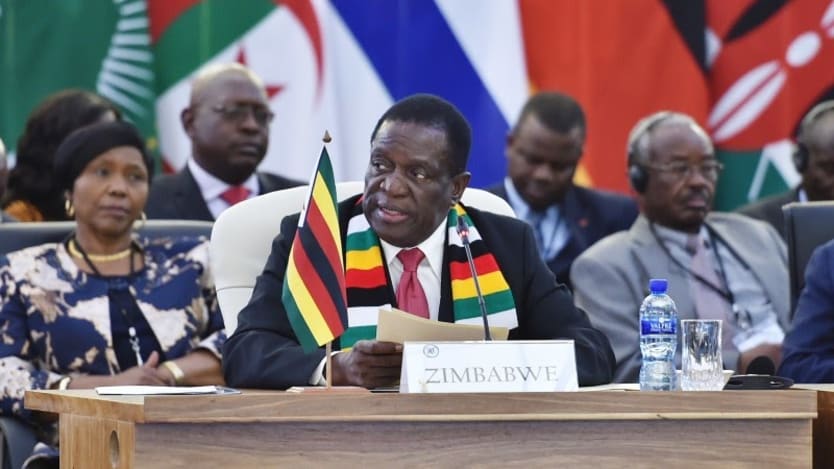
BRUSSELS — Ongoing mismanagement and corruption mean it is “out of the question” that the European Union will resume aid directly to the government of Zimbabwe anytime soon, according to the bloc’s ambassador to the country.
The government of President Emmerson Mnangagwa has “indicated that they would be interested in reverting back to budget support,” EU Ambassador Timo Olkkonen told Devex in an interview last week. “I can’t prejudge, of course, what happens with the [EU’s upcoming development assistance] programming exercise — but I would say, from my personal perspective, I think it would be impossible.”
The EU stopped sending money directly to government coffers in the southern African nation in 2002, citing violations of human rights and democratic principles under then-President Robert Mugabe. Three years ago, when Mnangagwa seized power from his former mentor in a coup and declared the country “open for business,” Brussels offered the prospect of greater assistance in exchange for free and fair elections.
“We have to think about how we can support the country in a situation where the level of governance is not where we would like it to be.”
— Timo Olkkonen, EU ambassador to ZimbabweInstead, soldiers killed at least six people in the aftermath of the 2018 election that was won by Mnangagwa and criticized by international observers. In recent months, a government crackdown has seen the arrest of domestic opponents and journalists, such as Hopewell Chin'ono, who had reported on a corruption scandal involving COVID-19 supplies.
“Is there really a break with the past?” Olkkonen asked. “Security forces are very heavy-handed, and the treatment of many of these government critics just seems very, very unfair.”
Asked whether the country’s judiciary is independent of the ruling ZANU-PF party, Olkkonen said that “there are clearly cases where you can question [whether] there are political motives behind some of those decisions.” Citing unsuccessful bail applications and countercharges against government critics, he said that “many of these cases really look like overreaction, and then there is also a [question] of fairness and equality of treatment.”
Economically, Olkkonen said skyrocketing inflation following the reintroduction of the Zimbabwe dollar was a symptom of structural problems, such as the “dysfunctional” agriculture sector, as well as “large-scale corruption” in the “very opaque” mining sector. More than half of the population requires food aid, he said. With around 90% of people working in the informal sector, COVID-19 — which has yet to peak in the country — has exacerbated the preexisting humanitarian, economic, social, and political crises, the ambassador said.
“The expected reforms have not been made,” Olkkonen said of Mnangagwa’s administration. “The country is in a very difficult place. They had discussions with the IMF [International Monetary Fund], but that has also now broken off. … We have to think about how we can support the country in a situation where the level of governance is not where we would like it to be.”
Between 2014 and 2020, the EU focused on health, agriculture, and good governance, steering funds through consultants and NGOs rather than the government. In the coming months, EU delegations around the world will report back to HQ in Brussels on what their priorities should be for the 2021-2027 period.
Foreign aid neglected in historic EU budget deal
After more than two years, European Union leaders finally agreed on a new budget for the bloc. But the results for development are mixed.
“What’s happening in the country and where the country is now will also influence our forthcoming programming exercise,” Olkkonen said. “It can’t be disengaged from that fact.”
In July, the EU foreign affairs chief, Josep Borrell, tweeted: “Recent developments in Zimbabwe are deeply worrying. The work of human rights defenders, journalists, and civil society organisations is essential to support reforms that stand the test of time. Upholding constitutional rights is a principle which cannot be compromised.”
However, that is not enough for Thandekile Moyo. During an online panel discussion last month, the Zimbabwean human rights advocate said that she had lost faith in the international community.
“I believe it is up to us Zimbabweans to save ourselves,” Moyo said, citing international inaction over the Gukurahundi massacres in the 1980s, the killings in Harare in 2018 despite the presence of election observers, and the recent disappearance and torture of government opponents. “I don’t think the international community will do anything. They’ve never done anything, and we might have to wake up to that reality and take it upon ourselves to free ourselves.”
Olkkonen said the EU had reacted to abuses in Zimbabwe, suspending aid to the government in the early 2000s and enforcing an arms embargo and an asset freeze on a company close to the military. However, he said he understood the frustration of locals, “seeing that the international community is, yes, condemning the situation, but then that would be the limit of it. Then the question would be, what would they expect the EU or other western countries to do? And obviously there are limitations to that, what is possible and what is not.”
He said the EU had been encouraging regional African bodies to get more involved in Zimbabwe. “So far we haven’t heard much from [the Southern African Development Community], but we did have for the first time quite a critical comment from the African Union Commission, and I think that’s encouraging.”








